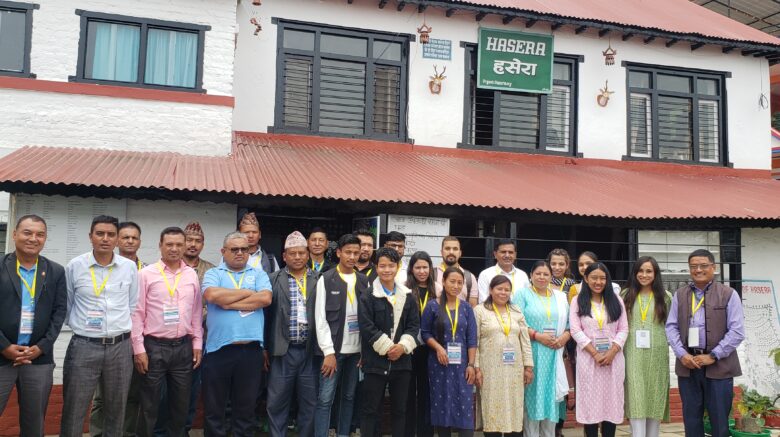Background:
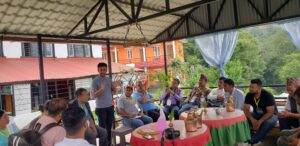 Shikharapur Community Learning Center has been assisting new farmers, model farmers and agricultural technical schools by carrying out various activities related to agriculture based on the philosophy of “Krishi Mulashch Jeevanam” (Agriculture is life.). The goal of establishing a model Agricultural Learning Resource Center (ALRC) in Shikharapur for the sustainable development and promotion of the agricultural sector is getting closer. Establishment of ALRC is our common mission with our partner organization ONGD-FNEL Scouts and Guides, Luxembourg. In order to set up a resource center, it is necessary to observe other resource centers while moving ahead with some steps. Accordingly, the center has completed an observation visit to Hasera Agricultural Research Center in Dhulikhel Municipality of Kavrepalanchok District. The visit was attended by 25 people from Dakshinkali Municipality and Indrasarovar Municipality.
Shikharapur Community Learning Center has been assisting new farmers, model farmers and agricultural technical schools by carrying out various activities related to agriculture based on the philosophy of “Krishi Mulashch Jeevanam” (Agriculture is life.). The goal of establishing a model Agricultural Learning Resource Center (ALRC) in Shikharapur for the sustainable development and promotion of the agricultural sector is getting closer. Establishment of ALRC is our common mission with our partner organization ONGD-FNEL Scouts and Guides, Luxembourg. In order to set up a resource center, it is necessary to observe other resource centers while moving ahead with some steps. Accordingly, the center has completed an observation visit to Hasera Agricultural Research Center in Dhulikhel Municipality of Kavrepalanchok District. The visit was attended by 25 people from Dakshinkali Municipality and Indrasarovar Municipality.
Purpose of the visit:
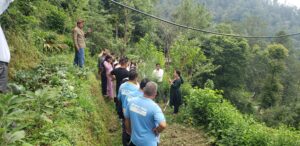 Shikharapur Community Learning Center aims to establish the ALRC for the development and promotion of the agricultural sector. Meetings and workshops have been held with various experts for the formulation of resource center program and operation strategy and discussions have been held on meeting strategy and planning. This visit is organized as many things can be learned by studying other resource centers as per the advice of experts. The purpose of the visit is as follows.
Shikharapur Community Learning Center aims to establish the ALRC for the development and promotion of the agricultural sector. Meetings and workshops have been held with various experts for the formulation of resource center program and operation strategy and discussions have been held on meeting strategy and planning. This visit is organized as many things can be learned by studying other resource centers as per the advice of experts. The purpose of the visit is as follows.
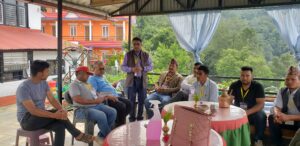 To know about the things that can be included in the resource center
To know about the things that can be included in the resource center- To enhance learning for agri-entrepreneurs
- To try to include and use agricultural education in school education
- To motivate the youth in agriculture
- To operate a full capacity agricultural learning resource center
Introduction to Hasera:
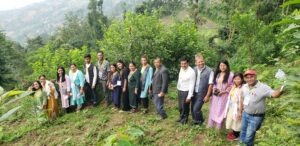 There is Hasera Agricultural Research Center in Dhulikhel Municipality, Kavrepalanchok District. The directors of the center are Govinda Dhital, Mithu Dhital and Bibek Dhital. This center is being operated privately and not with any group or institutional investment. As a family business, various agricultural works are being conducted on 9 ropanis of land. Although the center was started 30 years ago, it has been operating continuously since 2063 BS. This HA- SE- RA name is indicated by the colors green (Hariyo), white (Seto) and red (Rato). We got information that green color means vegetable, white means milk, yoghurt and red means meat. The center covers organic vegetables and permaculture. The theory of permaculture includes the following:
There is Hasera Agricultural Research Center in Dhulikhel Municipality, Kavrepalanchok District. The directors of the center are Govinda Dhital, Mithu Dhital and Bibek Dhital. This center is being operated privately and not with any group or institutional investment. As a family business, various agricultural works are being conducted on 9 ropanis of land. Although the center was started 30 years ago, it has been operating continuously since 2063 BS. This HA- SE- RA name is indicated by the colors green (Hariyo), white (Seto) and red (Rato). We got information that green color means vegetable, white means milk, yoghurt and red means meat. The center covers organic vegetables and permaculture. The theory of permaculture includes the following:
- To establish a clean, beautiful environment
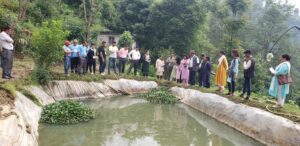
- Nature friendly farming system
- Healthy life
- Don’t let others affect what you do
- Environment friendly
- Participating in financial gain
- Discretionary rites
- Self-satisfaction
- Outbreak prevention
- Elemental analysis
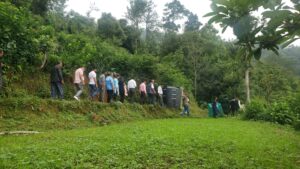
The center specializes in conserving and using herbs. Locally available herbs can be easily used in the kitchen and it is clear that human health can be maintained through their use. Cultivation based on the condition of the soil and the nature of the soil will diversify the crops and the land will not be wasted. Planting long-lived plants on moist soil, planting fruit trees on sloping soil, can prevent soil erosion. It is said that different crops can be planted in one tunnel. The use of chemical manure can be reduced by making manure from cow dung. It is said that various crops have been planted on the same land depending on the condition of sun and shade. The center is not fully commercial but has been developed as a resource center. It has become a dynamic and vibrant study center by making full use of its land. The land has been cultivated by dividing the area on the basis of soil. Indigenous herbs and crops are plentiful in the center. Manager of the center Mithu Dhital clarified about the center. Arrangements have been made for sewing and distribution of environment friendly and women’s health friendly household sanitary pads. Annually many students are taking this center as an educational learning. One of the burning tasks seen in the center is the national seed collection seed bank. This is an important task and contribution to the community in the current situation where locally available weed seeds are disappearing.
Exposure activities:
- Participants introduction
- Sharing the objective of Visit
- Site and farm tour
- Formal discussions and interactions
Learning from the exposure:
This visit was not only for general visit but also for the establishment of Agricultural Learning Resource Center at Shikharapur. The purpose of establishing the center was to learn from the work done by other resource centers. Eg. What kind of knowledge could be gained for the resource center? Overall, the following are the lessons learned from the trip:
- On-site observation is an important aspect of learning
- Crops should be planted according to the condition of the land
- Not only commercial farming but also permaculture method can be benefited
- Long life and high value plants should be planted
- Soil conservation is more important than farming
- Agricultural is culture and also way of life
- Agriculture can be a means to stop the youth in the country
- Permaculture is an indispensable issue to protect the environment
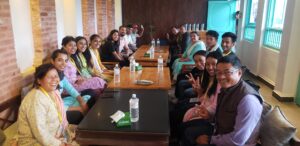 Agriculture is an important economic production area for Dakshinkali Municipality and Indrasarobar Municipality. The school has 276 ropanis of land in Kalika Agricultural School located in Indrasarobar Rural Municipality. Similarly, the Tribhuvan Adarsha Secondary School in Dakshinkali also has ample land. From this visit, it has been learned that school land can be made a subject of study for the students. It is necessary to teach the students by playing on the soil, now it is necessary to impart knowledge of permaculture to the children. Hasera’s visit has emphasized not only for farming but also for cultural development and environment protection.
Agriculture is an important economic production area for Dakshinkali Municipality and Indrasarobar Municipality. The school has 276 ropanis of land in Kalika Agricultural School located in Indrasarobar Rural Municipality. Similarly, the Tribhuvan Adarsha Secondary School in Dakshinkali also has ample land. From this visit, it has been learned that school land can be made a subject of study for the students. It is necessary to teach the students by playing on the soil, now it is necessary to impart knowledge of permaculture to the children. Hasera’s visit has emphasized not only for farming but also for cultural development and environment protection.
Transformation:
Shikharapur ALRC, which is coming in operation in near future has a lot of knowledge and skills to learn and use from Hasera Resource Center. As the resource center it is a place of learning. The environment around it needs to be a living experience that speaks itself. The atmosphere of Hasera region and the atmosphere of Shikharapur may be different. Rather than imitating, the resource center should be set up according to the needs of the community, based in the environment of the same periphery as well. It seems necessary to impart knowledge of permaculture to the farmers. The methods adopted for soil conservation are exemplary in this field. In this way, if the learning of Hasera Resource Center can be transformed into Shikharapur ALRC, it can become a model resource center of the country.
Conclusion:
From the point of view of participation, the visit has been effective and purposeful. This visit has been very instructive for the organizations and individuals who have moved forward for the development of the agricultural sector. Also, Shikharapur has taken this visit as a guide for the resource center to be built in the coming days.
#ONGD-FNEL #ShikharapurCLC #permaculture #organicfarming #learningtrip #beingyouth
Report by :
Lalita Lamichhane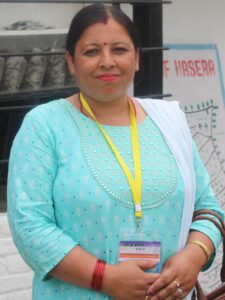
Coordinator, Shikharapur Open School
Edited By: Niroj Shrestha (Program Manager)
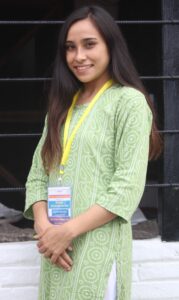
Aayusha Bhandari (Program Assistant)

